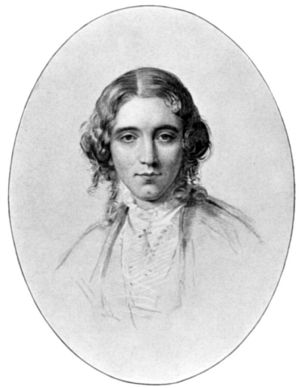Difference between revisions of "Harriet Beecher Stowe" - New World Encyclopedia
Laura Brooks (talk | contribs) (importing, category and crediting) |
m (→Credits) |
||
| Line 39: | Line 39: | ||
* [[Slavery]] | * [[Slavery]] | ||
| − | == | + | ==Credits== |
| − | + | ||
| + | http://digital.library.upenn.edu/women/stowe/StoweHB.html | ||
| + | |||
| + | |||
| + | |||
| + | |||
| + | |||
| + | |||
| + | |||
| + | Stowe, Harriet Beecher. (2006). In Encyclopædia Britannica. Retrieved August 31, 2006, from Encyclopædia Britannica Online Library Edition: http://www.library.eb.com/eb/article-9069861 | ||
| + | Aug 31 2006 | ||
| + | |||
| + | |||
| + | |||
| + | |||
| + | |||
| + | http://womenshistory.about.com/gi/dynamic/offsite.htm?zi=1/XJ&sdn=womenshistory&zu=http%3A%2F%2Fwww.chfweb.com%2Fsmith%2Fharriet.html | ||
| + | Aug 31 2006 | ||
==References and further reading== | ==References and further reading== | ||
Revision as of 20:25, 31 August 2006
Harriet Elizabeth Beecher Stowe, born Harriet Elizabeth Beecher (June 14, 1811 – July 1, 1896) was an abolitionist and writer of more than 10 books, the most famous being Uncle Tom's Cabin which describes life in slavery, and which was first published in serial form from 1851 to 1852 in an abolitionist organ, the National Era, edited by Gamaliel Bailey. Although Stowe herself had never been to the American South, she subsequently published A Key to Uncle Tom's Cabin, a non-fiction work documenting the veracity of her depiction of the lives of slaves in the original novel.
Her second novel was Dred: A Tale of the Great Dismal Swamp: another anti-slavery novel.
Born in Litchfield, Connecticut and raised primarily in Hartford, she was the daughter of Lyman Beecher, an abolitionist Congregationalist preacher from Boston and Roxana Foote Beecher, and the sister of renowned minister, Henry Ward Beecher. She had two other prominent and activist siblings, a brother, Charles Beecher, and a sister, Catharine Beecher. In 1832, her family moved to Cincinnati, another hotbed of the abolitionist movement, where her father became the first president of Lane Theological Seminary. There she gained first-hand knowledge of slavery and the Underground railroad and was moved to write Uncle Tom's Cabin, the first major American novel with an African-American hero.
In 1836 Harriet Beecher married Calvin Stowe, a clergyman and widower. Later she and her husband moved to Brunswick, Maine, when he obtained an academic position at Bowdoin College. Harriet and Calvin had seven children, but some died in early childhood. Her first children, twin girls Hattie and Eliza, were born on September 29, 1836. Four years later, in 1840, her son Frederick William was born. In 1848 the birth of Samuel Charles occurred, but in the following year, he died from a cholera epidemic. She is buried on the grounds of Phillips Academy in Andover, Massachusetts.[1]
The Harriet Beecher Stowe House in Cincinnati, Ohio is the former home of her father Lyman Beecher on the former campus of the Lane Seminary. Harriet lived here until her marriage. It is open to the public and operated as an historical and cultural site, focusing on Harriet Beecher Stowe, the Lane Seminary and the Underground Railroad. The site also presents African-American history. The Harriet Beecher Stowe House in Cincinnati is located at 2950 Gilbert Avenue, Cincinnati, OH 45206. [1]
Quotations
- When Stowe met Abraham Lincoln in 1862 (during the Civil War), he reportedly greeted her, "So you're the little woman who wrote the book that started this great war!"
- "The bitterest tears shed over graves are for words left unsaid and deeds left undone."
Partial list of works
- Uncle Tom's Cabin (1851)
- A Key to Uncle Tom's Cabin (1853)
- Dred, A Tale of the Great Dismal Swamp (1856)
- The Minister's Wooing (1859)
- The Pearl of Orr's Island (1862)
- As "Christopher Crowfield"
- House and Home Papers (1865)
- Little Foxes (1866)
- The Chimney Corner (1868)
- Old Town Folks (1869)
- The Ghost in the Cap'n Brown (1870)
- Lady Byron Vindicated (1870)
- My Wife and I (1871)
- Pink and White Tyranny (1871)
- We and Our Neighbors (1875)
- Poganuc People (1878)
See also
- Origins of the American Civil War
- Abolitionism
- Slavery
Credits
http://digital.library.upenn.edu/women/stowe/StoweHB.html
Stowe, Harriet Beecher. (2006). In Encyclopædia Britannica. Retrieved August 31, 2006, from Encyclopædia Britannica Online Library Edition: http://www.library.eb.com/eb/article-9069861 Aug 31 2006
References and further reading
- Adams, John R. (1963). Harriet Beecher Stowe. Twayne Publishers, Inc.. Library of Congress Catalog Card No. 63-17370.
- Jeanne Boydston, Mary Kelley, and Anne Margolis, The Limits of Sisterhood: The Beecher Sisters on Women's Rights and Woman's Sphere (U of North Carolina Press, 1988),
- Matthews, Glenna. "'Little Women' Who Helped Make This Great War" in Gabor S. Boritt, ed. Why the Civil War Came - Oxford University Press pp 31-50.
- Constance Mayfield Rourke; Trumpets of Jubilee: Henry Ward Beecher, Harriet Beecher Stowe, Lyman Beecher, Horace Greeley, P.T. Barnum (1927).
- Thulesius, Olav (2001). Harriet Beecher Stowe in Florida, 1867-1884. McFarland and Company, Inc..
- Weinstein, Cindy. The Cambridge Companion to Harriet Beecher Stowe. Cambridge Companions to Literature (Cctl). Cambridge, England: Cambridge UP, 2004. ISBN 9780521533096 Template:Invalid isbn(pbk.); ISBN 9780521825924 Template:Invalid isbn(hbk.)
External links
- Harriet Beecher Stowe House & Center - Stowe's adulthood home in Hartford, Connecticut
- Harriet Beecher Stowe Society—Scholarly organization dedicated to the study of the life and works of Harriet Beecher Stowe
- Brief biography at Kirjasto (Pegasos)
- The Online Books Page (University of Pennsylvania)
- Works by Harriet Beecher Stowe. Project Gutenberg
- Life of Harriet Beecher Stowe Compiled From Her Letters and Journals by Her Son Charles Edward Stowe, available for free via Project Gutenberg
- Harriet Beecher Stowe's brief biography and works
- History's Women: Harriet Beecher Stowe.
Template:72921791


